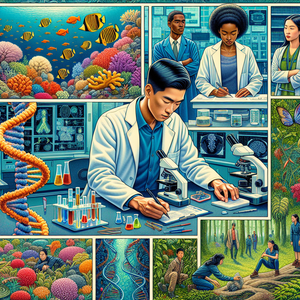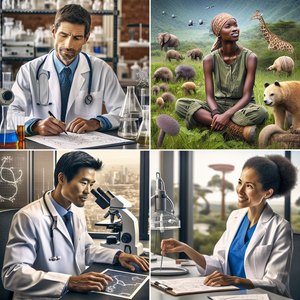
Exploring Diverse Career Paths in Biology: From Marine Wonders to Forensic Insights and Conservation Efforts
Biology, the study of life, offers a wealth of career opportunities that cater to a wide range of interests and specializations. This vibrant field encompasses roles that vary from marine biologists who delve into the mysteries of oceanic ecosystems to forensic scientists who employ biological techniques to solve crimes. The diversity inherent in biology not only highlights the many ways professionals contribute to our understanding of life but also reflects the dynamic nature of the life sciences. This article provides an in-depth look at various biology-related careers, focusing on current job market trends, educational requirements, and potential career paths, to help guide aspiring biologists in their professional endeavors.
Job Summaries:
Marine Biologist:
- Marine biologists play a crucial role in exploring oceanic life.
- They study everything from fish populations to marine mammals.
- They engage in fieldwork, collect samples, and analyze data to understand marine ecosystems.
- A bachelor’s degree in marine biology or a related field is essential.
- Many research roles favor candidates with advanced degrees.
- Their efforts are vital in conservation initiatives aimed at mitigating climate change impacts on marine environments.
Forensic Biologist:
- Forensic biologists apply biological methods to analyze evidence in criminal investigations.
- They meticulously examine biological samples such as blood and hair, aiding in the identification of victims and suspects.
- A solid foundation in biology, chemistry, and criminal justice is crucial, typically necessitating a bachelor’s degree in forensic science.
- Their scientific insights are invaluable in the legal system, where they can drastically influence case outcomes.
Wildlife Biologist:
- Wildlife biologists focus on studying animal populations and their habitats.
- Emphasizing conservation and resource management.
- Conducting field studies and analyzing animal behavior.
- A degree in wildlife biology or ecology is fundamental for entering this field.
- Advanced degrees preferred for leadership roles.
- Play a key part in biodiversity assessments.
- Promoting sustainable wildlife management practices.
Microbiologist:
- Microbiologists delve into the world of microorganisms, conducting experiments that reveal their behaviors and interactions.
- A bachelor’s degree in microbiology or a related biological science is typically required, with many positions requiring advanced degrees for specialized research.
- Their contributions are crucial in sectors like healthcare, agriculture, and environmental science, helping to improve treatments and ecosystem health.
Conservation Biologist:
- Focusing on the protection of biodiversity, conservation biologists study species and ecosystems to devise effective conservation strategies.
- A degree in conservation biology or environmental science is generally required, with advanced degrees necessary for higher-level positions.
- Their work is pivotal in addressing environmental challenges and advocating for sustainable practices.
Ecologist:
- Ecologists investigate the intricate relationships between organisms and their environments.
- They employ field research and data modeling to assess ecosystem health.
- A bachelor’s degree in ecology is common, with advanced degrees preferred for research roles.
- Their findings play a crucial role in shaping environmental policies and conservation efforts.
Zoologist:
- Zoologists specialize in animal physiology and behavior.
- They conduct both field and laboratory research.
- A bachelor’s degree in zoology is essential.
- Advanced degrees may be necessary for research-focused positions.
- They significantly contribute to wildlife conservation and educational outreach.
Biological Engineer:
- Biological engineers integrate engineering principles with biological sciences to create solutions for healthcare and environmental challenges.
- A degree in biological engineering is essential, often requiring a master’s for advanced roles.
- Their innovations have far-reaching implications across various industries, including biotechnology.
Molecular Biologist:
- Molecular biologists investigate biological processes at the molecular level, particularly focusing on DNA and protein interactions.
- A degree in molecular biology or a related field is required, with advanced degrees favored for research positions.
- Their work is critical for advancements in healthcare and genetic research.
Biochemist:
- Biochemists study the chemical processes within living organisms.
- Typically requiring a degree in biochemistry or a related discipline.
- Advanced degrees are preferred for research roles.
- Their findings are instrumental in drug development and agricultural enhancements.
Genetic Counselor:
- Genetic counselors assess genetic risks and guide individuals through their health decisions regarding genetic conditions.
- This role typically requires a master’s degree in genetic counseling, making their expertise invaluable in healthcare settings.
Plant Biologist:
- Plant biologists focus on plant life and its ecology.
- Requires a degree in plant biology or botany.
- Advanced degrees are often necessary for research roles.
- Their work contributes to agricultural practices.
- Helps in understanding climate change impacts.
Biophysicist:
- Biophysicists explore the physical principles underlying biological processes.
- Often requiring a Ph.D. for research positions.
- Their investigations advance medical technologies and drug development.
Evolutionary Biologist:
- Evolutionary biologists study species evolution through genetics and fossils.
- A degree in evolutionary biology is essential, with advanced degrees preferred for research.
- Their work informs conservation strategies aimed at preserving biodiversity.
Immunologist:
- Immunologists focus on the immune system and its responses.
- A degree in immunology or microbiology is necessary.
- Advanced degrees are often required for research.
- Their contributions are vital to public health initiatives.
Bioinformatics Specialist:
- Bioinformatics specialists utilize computing and statistical methods to analyze biological data.
- A degree in bioinformatics or computational biology is required.
- Advanced degrees are often necessary for specialized roles.
- Specialized roles drive personalized medicine advancements.
Entomologist:
- Entomologists study insect biology and ecology.
- Typically requiring a degree in entomology.
- Advanced degrees may be necessary for research roles.
- Their research impacts agriculture and public health efforts.
Toxicologist:
- Toxicologists examine chemical effects on living organisms.
- A degree in toxicology or pharmacology is required.
- Advanced degrees are often needed for research positions.
- Their work is essential for public health and environmental safety.
Phycologist:
- Phycologists focus on algae and aquatic plants.
- Usually requiring a degree in phycology or botany.
- Advanced degrees are preferred for research roles.
- Their insights are critical for understanding aquatic ecosystems.
Biostatistician:
- Biostatisticians apply statistical methods to biological research.
- A degree in biostatistics is necessary.
- Advanced degrees are often needed for specialized roles.
- Specialized roles contribute to healthcare research.
By exploring these diverse career options, aspiring biologists can identify paths that resonate with their passions and skills while making significant contributions to the life sciences. For those contemplating a career in biology, staying attuned to current trends and demands within the job market is essential for successful navigation in this ever-evolving field. Engaging with professionals in these roles, attending relevant workshops, or seeking mentorship can also provide invaluable insights and enhance one’s journey in the biological sciences.
Explore More Jobs

